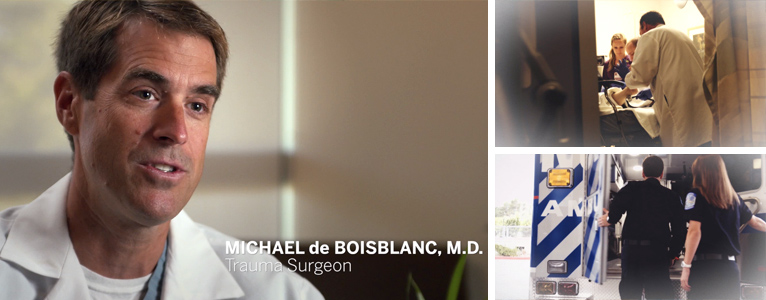John Muir Health Now Using Whole Blood Transfusions for Trauma Patients
Sept, 2019

Transfusing whole blood, in addition to the use of blood transfused in its individual components – cells, plasma and platelets, gives clinicians more options depending on the patient’s condition.
Whole blood transfusions were common up until the 1970s when blood began to be transfused in its components. This process allowed for longer storage of components and conservation of blood products that are in short supply. However, recent medical research from the wars in Iraq and Afghanistan, as well as studies in trauma centers across the country, have shown the benefit of transfusing whole blood in emergency situations.
“Bleeding caused by traumatic injury is the number one cause of potentially preventable death among trauma patients in the world,” said Michael deBoisblanc M.D., Trauma Program Medical Director. “A blood transfusion is often needed to reverse shock when patients have lost a significant volume of blood and when there is ongoing bleeding.”
Dr. deBoisblanc, who has been deployed overseas with the U.S. Army Reserve as a surgeon, says whole blood can reverse shock better than the transfusion of blood components in military and civilian medical settings using less blood in total. John Muir Health receives whole blood from the American Red Cross. Each unit of whole blood must be low titer type O, which can be transfused as a universal blood product, and has a shelf life of 21 days.
John Muir Health’s Walnut Creek Medical Center was designated as a trauma center in 1986 by Contra Costa County and is verified by the American College of Surgeons (ACS). Only a select group of medical centers receive Level II Trauma Center verification from the ACS by meeting essential criteria that ensure trauma care capability and by consistently demonstrating a high level of performance and quality. As a Level II Trauma Center, the medical center has 24-hour immediate coverage by general surgeons, as well as orthopedic, neurosurgery, anesthesiology, emergency medicine, radiology and critical care specialists.
The medical center also has a dedicated trauma team with specially trained nurses, as well as surgical suites, an intensive care unit and a recovery unit dedicated to trauma patients. In addition, a rooftop helipad facilitates rapid patient transport from anywhere in the Bay Area.